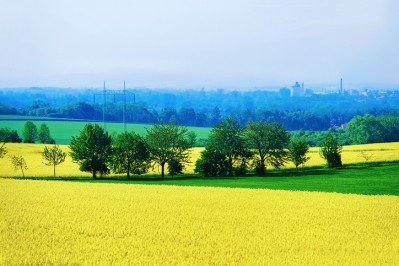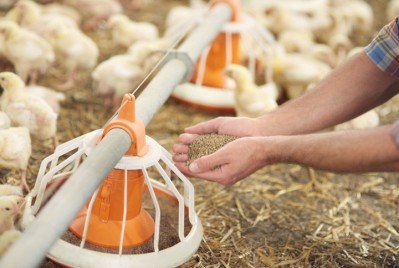The big read: Greening the UK feed industry

James McCulloch, feed sector lead, AIC, also shared his thoughts on how the farming and feed sectors can tackle the ongoing myths and agri-bashing related to livestock and feed production. He referenced the developing EU collective action against such misinformation and the controversial BBC documentary on meat production late November that raised the ire of UK farming and feed sectors for what they saw as blatantly unbalanced coverage.
The AIC also called on the new government for strong leadership on agricultural issues, following the Conservative Party’s landslide win in the general election last week.
The trade group said it welcomes the fact the election result provides a greater degree of certainty, principally over Brexit, than has been the case since 2017.
Paul Rooke, head of policy at AIC, said “irrespective of views on the UK leaving the EU, we can now start to understand, with a greater degree of clarity, the road ahead.”
The European Livestock Voice, a group of EU-based organizations, has been active in Brussels and beyond in recent weeks, taking to the streets and to social media to try and address the danger of oversimplifying the debate around livestock and its role in European society. Their actions followed numerous farmer protests in different European countries over the past few months.
McCulloch praised such EU collective action as well as the work being done by UK campaigners trying to create more awareness about the benefits of both farming and meat consumption, but he believes there is an inherent anti-meat bias when it comes certain commentators and organizations, a bias that was clearly evident in the recent BBC documentary, he maintained.
That kind of partiality makes it challenging for the feed and farming industries to engage, he said.
Also tricky for both industries is getting what is, to some extent, a slightly drier, technical message, as opposed to an emotive one, across to the public at large on what are the benefits of feed and livestock production.
“We have certainly recognized that as an industry we are very good at talking to ourselves, but we are not that good, or we need to get better at engaging with a wider audience, and to be proactive, not to be always on the back foot. The big thing is to engage on a digital platform, we have got to be much smarter about that, about getting our message out on social media, which is not a natural medium for our industry," said McCulloch.
Sustainability roadmap
However, from a feed industry standpoint, he said the AIC really wants to focus now on what it is doing as far as the whole sustainability agenda is concerned: “That is the more positive message.”
The trade representatives, he said, are in the process of developing a sustainability road map.
The UK feed industry is acutely aware that sustainability is the number one priority, he said. While there are several feed companies in the UK already leading in this area, with long-standing environment focused initiatives, some regional players are seeking guidance on how best to address future challenges in this respect and this is where the AIC has to step in, said McCulloch
“As well as producing a roadmap and a timeline of proposed actions, we have engaged a new technical manager, who is developing assurance models on sustainability. We want to show how our industry can be part of the solution, not part of the problem.”

Targets
The UK has committed to ‘net zero’ greenhouse gas (GHG) emissions by 2050. Even more ambitious targets were set by the UK National Farmers Union (NFU) in September this year, with it unveiling its vision of how farming can reach net zero GHG emissions by 2040. And, of course, there are other targets under the country’s clean air and water acts.
"We want to map out to our members what actions they can take, if they are not doing so already, to hit those targets.
“We are going to use some of the UN Sustainable Development Goals (SDGs) as the themes and identify, within those goals, the short, medium, and long-term actions that feed businesses [and other ag input sectors] can take. We will give some scoring as far as the likely impact is concerned.”
A feed company could then select the actions that are most suitable to its business:
“Obviously responsible sourcing is going to be a major one, or a company could decide to aim for an all-electric feed delivery fleet by 2040. However, we are also trying to help members to focus on actions beyond the environmental aspects of sustainability, even if all of the debate is largely centered on those aspects. Evidently, there is economic and social sustainability as well,” said McCulloch.
Measuring success
Compliance led sustainability is not the way forward, believes the AIC. It argues that it should be performance led - measuring progress is essential, and having the means to do so is key.
“We have now got the PEF category rules and the Global Feed LCA Institute (GFLI) has been launched as a legal entity."
On farm-based measurements are crucial as well. The AIC’s Feed Adviser Register (FAR) includes a group of professionally qualified feed advisers whose remit is to advise not only on diets but also about environmental performance of the farm.
“We see a role for those feed advisers in terms of looking at optimization of feed conversion ratios, protein conversion ratios, reduction in nitrogen and phosphorus excretions, and being able to measure that, along with water and energy use on farm.
"While these are all aspects that can be measured, again the trick is going to be in gathering the data. But when the industry is challenged on what progress it is making on these commitments, then we will be able to share an industry-wide set of actions, showing we are taking X amount of tons of carbon out of the economy, and that we are meeting our air and water targets as well.
"No one is suggesting it is going to be simple. But the ambition is clearly to be able to hit the targets,” he added.
Good stories to tell
McCulloch again reiterated that a lot of what the feed industry had already done, in the UK and elsewhere, in terms of achieving environmental gains, has not been communicated effectively to a mainstream audience, and he wonders whether, perhaps, the terminology used by the feed sector is off-putting. “Who outside of the industry knows what a co-product is?"
“FEFAC has produced a fantastic document on co-products, it shows how rice bran, a co-product of rice milling for human consumption, is not suitable for human consumption, but is a very valuable feed component, similarly for wheat bran, molasses, and sugar beet pulp."
But such industry practice is not widely known, he said.
“Then we have the former foodstuffs products sector – in the UK, some 650,000 tons of food products that, for some reason, are not hitting the retail shelves are being processed into animal feed.
"We might have been viewing those kind of initiatives, previously, through a value prism as opposed to a sustainability one but, I think, perhaps, we are now waking up to the fact, if a bit late, that we have some really good [sustainability] messages to share [about the feed industry]."
The recent publication by the EU Commission of the EU protein balance sheet generated another good story for both the UK and EU feed and farming sectors to tell, he said. That document demonstrates how roughage, such as grass and silage maize, is the main source of feed protein, representing 45% of EU total feed use. “Animals are largely eating things that we cannot, and that message is not being put in the right forum in order to get it picked up.”
Protein picture
McCulloch admits, though, that UK farmed animal sectors such as fast-growing broiler production will continue to be heavily reliant on imports of soybeans with high protein content. Soybean from Latin America is linked in the public mind with environmental damage, and pressure is continually being brought to bear on the industry on this aspect from NGOs and others.
“Yes, while we are engaged with alternative protein initiatives such as the Insect Biomass Conversion Task & Finish Group (IBCTFG), and we believe there will be contributions eventually from algae, seaweed and other protein sources, it would be wrong to suggest we are going to cease to be reliant on soy for sectors that have high-protein feed requirements.
“But the messaging here is to say that we need to increase the percentage of the soy coming into the UK that is responsibly sourced.”
The UK Roundtable on Responsible Soy has representation from throughout the UK farm to fork supply chain and will prove critical in working towards physical flows of sustainable soy in the future, he said.
Methane mitigation, gene editing
“The one area I also think is worth mentioning is innovation, whether that is about novel feed additives mitigating methane emissions or whether that relates to other areas such as plant breeding and animal genetics. Animals could be selected because they are better at digesting or are from low emitting families; new plant breeding techniques like gene editing could improve digestibility of certain feed materials, for example. If we have the opportunity to embrace science and have that assessed from a risk standpoint as opposed to a hazard one, I think there are opportunities there.”
He believes there is sufficient interest and lobbying going on to ensure that the EU Court of Justice (ECJ) ruling from July 2018 on new plant breeding techniques (NBPTs) will be reassessed.
“I think the industry’s view on NBPTs was very clear - that they are set of useful techniques and they might have some very valuable benefits as far as the whole sustainability debate is concerned. The [ECJ ruling] was almost like saying to our industry ‘you have got to become more sustainable, but we are going to tie one hand behind your back.’
"That is clearly not where we want to be.”













